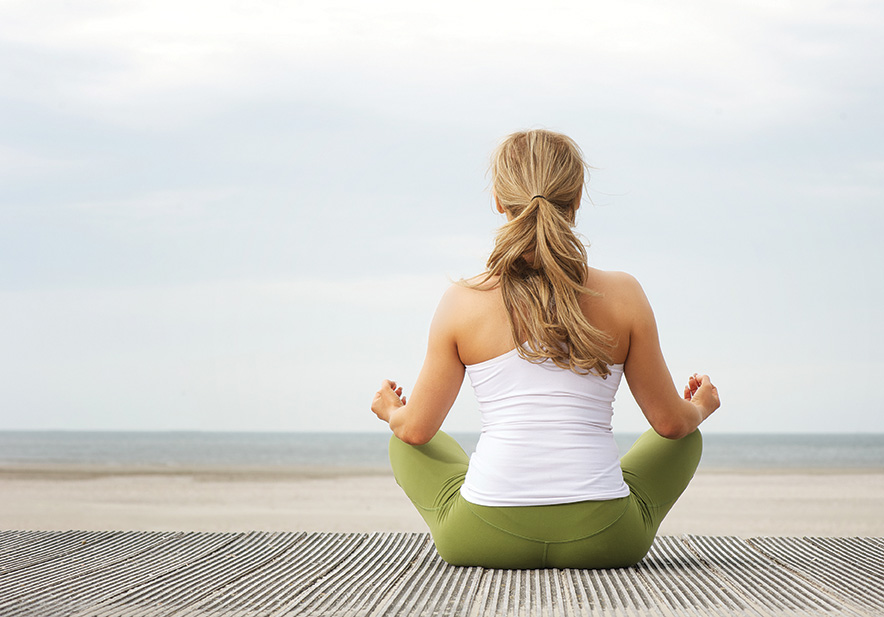Keeping your body and mind healthy should be a priority. It’s the little things we do every day that can have a lasting effect on us: the way we handle stress, what we eat, how we exercise. If we remember to live our lives with mindfulness, positive lifestyle habits will follow, setting us on the path to health.
[a quiet mind]
Whether you’re trying to drown out noise, reduce stress or simply relax, meditation may be the answer. According to the National Center for Complementary and Integrative Health, meditation is a mind and body practice that has long been used to increase calm and physical relaxation, improve psychological balance, cope with illness, and enhance overall well-being.
becoming mindful
Although it’s an ancient practice, meditation has exploded in the last 10 years, says Elizabeth Fryer, M.A., LMFT, a psychotherapist and founder of St. Louis Insight Meditation Group. “Mindfulness is a way of approaching the world and being present in the moment,” she says. “It is being used all over for stress reduction with mood disorders, anxiety and attention deficits.” People are over-stimulated today, Fryer says, and the practice of mindfulness helps focus the mind so they don’t feel so disoriented by all the distractions. It is a way to be present, in the moment, with all five senses.
For someone practicing mindfulness for the first time she recommends finding a quiet spot and focusing on the breath and it sounds for about 5 to 15 minutes. “This is a practice, and it can take time to train your mind,” Fryer says. “I compare it to playing the piano. You first learn the scales, but you must continue to practice if you want to be more accomplished.”
By focusing on the here and now, Fryer says you feel less stress than when you are thinking about the past or the future. Over time, she says you can bring this practice into every context of your life. For example, you may be talking with your boss and feel your mind getting upset. “You can step away and say to yourself, ‘I need a breath to center myself,’ rather than react right away,” Fryer says.
everyone can do it
“Many Type A personalities say they can’t meditate, but they just need to start,” says Lucy Teixeira of Aquarius Wellness Center for Healing Arts. As a licensed massage therapist, clinical nurse assistant and certified personal trainer, Teixeira has seen all types of personalities express doubts about their ability to meditate.
“It takes time, but you can find 2 minutes to start. You must learn how to clear your mind, calm your mind and tune in,” she says. “People can meditate 5 minutes here and there, two or three times a day, and it can help to clearly focus your day and to make you feel more relaxed and grounded. It can be very powerful.”
Teixeira says there are days when she finds help in her own meditation practice by choosing a guided meditation offering on iTunes. “Once I’ve done it for 5, 30, or even 90 minutes, I often ask myself why I haven’t been doing it more often,” she says. “Studies have shown that once we relax and find time for ourselves, we can help fight disease, stress, depression, and help our immune system.”
Mark Lumpkin, Ph.D., LMT, CPT, a licensed massage therapist at Aqaurius Wellness with a specialty in psychology, concurs about the benefits of meditation. “Coming from a martial arts and yoga background, meditation can sometimes seem too mystical,” he says. “But it’s really just a focus, a way to use tools and techniques to keep myself centered.”
He says once you get people to focus on their breath, they can find ways to meditate in many different situations. “Meditation can happen any time, any place,” Lumpkin says. For someone new to meditation, both practitioners recommend starting in the morning when you can find quiet and be focused. The first day, take five slow breaths, the next day, take 10, Teixeira suggests.
“It’s about being with yourself, being with your breath,” Lumpkin explains. “It’s like an exercise program. You can’t expect immediate results, but it’s something that becomes part of your day.”
[listen to your body]
Can you exercise too much? The short answer is yes. And your body will let you know it, too. That’s why, as with just about everything else, moderation is key. Finding the right balance of activity, accompanied by a healthy diet, is the most widespread prescription for wellness.
exercise addicts
“You absolutely can exercise too much,” says Steve Baum, owner of Iron Tribe Fitness. “Your nervous system can handle only so much stress, and exercise is stress.” Baum says a common misconception among avid exercisers is doing a lot of cardio, but not balancing it with strength training and rest for the body. “If somebody wants to get lean, they must do both cardio and strength training,” he says. “Preferably five to six days of exercise a week, short in duration, and no more than a maximum of 45 minutes.”
As a certified athletic trainer and assistant fitness manager at the St. Louis Jewish Community Center, Malinda Walker says she also sees many exercisers who want to focus solely on weights or cardio. “We find those who exercise too much often overeat and get too tired,” she says. It’s not uncommon to see avid exercisers compensate for big meals with big exercise sessions. She describes the symptoms of exercising too much as fatigue, trouble sleeping, hitting a plateau, and eating more calories than you are burning.
avoid the syndrome
“Rest and recovery is so important,” Walker says. “Everyone has to listen to their own body, and if you feel like you are doing more harm than good, you need to re-evaluate.”
Baum uses himself as an example of someone who was doing too much. He says after exercising regularly for 60 to 90 minutes a day, sometimes twice, he woke up one day and realized he couldn’t handle it. “I went from 8 percent body fat to being 70 pounds overweight,” says Baum, who sought help from an exercise physiologist. “I was over-training myself, and my tank was on zero. I was told not to exercise for six months.”
Seeing this firsthand made Baum realize the importance of moderation. “If you are over-training, your sleep is impaired, your cortisol levels can get too high, and you are not achieving the benefits of exercise,” he says.
better food vs. less food
Making sure that you are fueling your body with the right foods is very important for getting results, Walker says. “Nutrition and exercise go hand in hand,” she says. “You should be as close to nature as possible when it comes to nutrition, and avoid processed foods and sugars.” She recommends seeing a nutritionist to determine which diet would be best for your needs, and to understand how many calories are needed to match your exercise plan.
Baum says many of his clients have found success on a paleo-type diet to help them eliminate processed foods, grains and sugars that are not good for them. He does not advocate a no-carbohydrate diet, but rather one that includes healthy carbs.
developing a plan
Both Baum and Walker emphasize the importance of developing a fitness plan that includes both exercise and rest/recovery. Baum advises that unless someone is training for a marathon or triathlon, their routine should include various forms of cardio, like running, swimming or biking, along with strength training. “Many of my clientele are 50 and up, so we tailor their exercise,” he says. Walker says, ideally, people should exercise six days a week, and on the seventh, consider a walk. So they don’t exhaust the same muscle groups every day, she recommends developing a schedule that balances cardio with weights and rest.
SAMPLE ROUTINE
Day 1 Weights
Day 2 Cardio and weights
Day 3 Cardio
Day 4 Cardio and weights
Day 5 Weights
Day 6 Cardio
Day 7 Rest
[eating & age]
Aging is the inevitable journey of life, and food is the fuel for that journey. But as anyone with a little mileage on their speedometer knows, eating habits change with age. While we might be able to eat like a longshoreman in our youth, that won’t work into middle age. And hard as it may be to imagine, we may not want to eat a thing when we’re old. That won’t work, either.
senior slump
Dr. Joseph Flaherty, SLUCare geriatrician and professor of internal medicine, works with patients who are mostly in their 80s. “When you get into further senior years, it’s not as important what’s on your plate, but what’s around it,” he says. “Eating with others, having good social contact just makes eating more pleasurable.”
He says both eating and activity level are important to maintain. “Activity is important for all ages and can mean simply doing things like parking farther away or taking the stairs as part of your routine,” he advises. Dr. Stanley Birge, Washington University associate professor of medicine in the division of geriatrics and nutritional science, says even walking at a pace where you are slightly out of breath for 20 to 30 minutes a day can be beneficial.
He recommends the Mediterranean diet, supplemented by olive oil and a handful of walnuts each day, because this regimen has been found to improve functional abilities, and some studies report it also prevents or delays the onset of dementia. “What we don’t like to see is weight decline in older adults because they are not getting sufficient calories and micronutrients (vitamins and minerals in food),” Birge says. “Those who are losing weight are also losing muscle and their ability to function and be active.
senses & appetite
A change in the senses often accompanies aging. Sight, smell and taste may all decline, which will most definitely affect what we enjoy eating. “It’s fairly common in older adults to experience a loss of smell, which also relates to taste,” Birge says. “For some, it takes the fun out of eating, which becomes one of the causes in the decline of food intake.” He recommends adding more seasonings to enhance flavor.
Older adults also have a tendency not to drink as many fluids. “When we drink to satisfy thirst, a 50-year-old may consume a whole glass of water, while an 80-year-old may just need two or three sips,” says Flaherty, who adds that an inadequate amount of fluids and fiber in the diet can lead to constipation, a problem that often plagues people as they age.
Another common eating issue with aging is indigestion, more specifically gastroesophageal reflux. Birge says this may be related to lying down or going to bed too soon after eating.
mixing medicines
We often don’t realize that the medications we take, both prescription and over-the-counter, also can impact appetite, as well as the way we process vitamins and nutrients.
Birge says the average balanced American diet should provide you with all your daily needs, except for vitamin D. “A general misconception as we age is that we need more nutritional supplements, such as vitamins and minerals, and that really is not true,” he says. “The one supplement that might be needed is vitamin D, which typically is gained through exposure to sunlight. But as we age, our skin’s ability to convert sunlight energy into vitamin D becomes significantly diminished.”
He says when a person sees their doctor, they should bring along a detailed list of prescription medications, including all over-the-counter medicines, vitamins, supplements and minerals. This will help determine if there are any possible interactions. For example, a patient on Coumadin might take ginkgo biloba for memory, but this can be dangerous because it can increase the risk of bleeding.
“The multi-billion-dollar nutritional supplement business has caused us to believe they will make us better, but they can be very hazardous, if not fatal,” Birge cautions.








